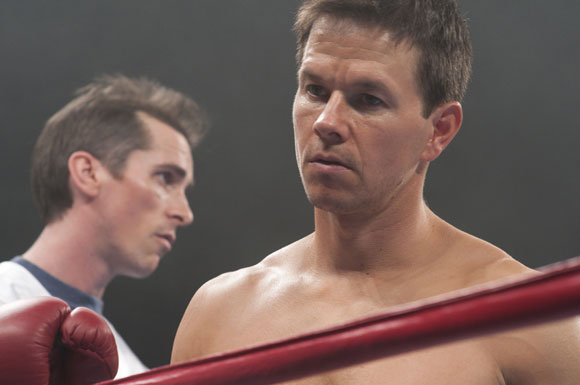The Fighter

(L-R) Christian Bale plays Dicky Eklund and Mark Wahlberg plays Micky Ward in THE FIGHTER. Photo credit: JoJo Whilden © 2010 Fighter, LLC. All Rights Reserved.

On July 18, 1978, Dickie Eklund, the “Pride of Lowell,” whose career spanned ten years—nineteen wins, four by knockout—lost to boxing legend Sugar Ray Leonard after ten rounds by unanimous decision. After his retirement, he coached his half-brother, Micky Ward to a successful career spanning 26 fights from 1985 to 1991, as well as three post-retirement fights against Arturo Gatti.
Played in the film by Christian Bale, Eklund was a subject of the 1995 HBO documentary titled High on Crack Street: Lost Lives in Lowell, which chronicled the day-to-day lives of three crack addicts in Lowell, Massachussetts. Eklund seems to believe that the filmmakers are capturing his return to boxing.
Instead of a conventional boxing/comeback story, the movie is a character study of Micky Ward (Mark Wahlberg) and the turbulent family life involving his mother Alice (Melissa Leo) and nine sisters, all of whom seem certifiably insane. By comparison, Micky is honest, forthright and hard-working. However, his family has him set up with a questionable manager who nearly gets him killed in his first bout out of retirement when Saul Mamby backs out due to the flu. The backup is 165-pound Mike Mungin; Dickie and Alice push Micky to take him. Says Ward, “He did not just get off the fuckin’ couch. If he did, I wanna buy a couch like that.”
Micky’s social life expands when he meets Charlene (Amy Adams) at a pub where she waitresses. Says the quick Charlene, “Are you just gonna stand there and stare at my ass? Your father stares at my ass but… he talks to me.” Charlene immediately recognizes the caustic environment keeping Micky from his aspirations to be the WBU Welterweight Champion. Tensions rise between her and the family, Alice and her ex-husband George (Jack McGee), Micky and Dickie; to call it a powderkeg would be putting it mildly.
Alice: “I’ve heard a lot about you.”
Charlene: “Really? I’ve heard a lot about you, too.”
Alice: “What’s that supposed to mean?”
Charlene: “Same thing you meant.”
The entire cast gives commendable performances, including the completely-transformed Erica McDermott lurking creepily in the backdrop as the bug-eyed, walking New England hair disaster Cindy ‘Tar’ Eklund. Additionally, Ward’s real-life trainer, Mickey O’Keefe, appears in the film as himself. Where many boxing films are swimming in archetypes and platitudes, the soft-spoken police officer and part-time boxing trainer grounds the story in reality.
Mr. Wahlberg and Ms. Adams turn out commendable performances. As George, Jack McGee effectively toes the line with Alice, knowing to pick and choose his battles carefully like any experienced husband. However, the standout is unquestionably Mr. Bale. Watching interviews as well as the 1978 Leonard-Eklund bout, it’s evident that the actor’s reputation for immersing himself in character is untarnished. A tragicomic portrayal, Mr. Bale emulates Eklund’s crack-afflicted bobbing and weaving, both in and out of the ring. To punctuate how eerily spot-on Mr. Bale’s performance captures the essence of Dickie’s fried synapses, footage of the real brothers rolls with the end credits.
Director David O. Russell employs both conventional and hand-held setups to create the documentary perspective on Dickie’s life alongside the film narrative of Micky’s. He also has a good grasp of realism. When Charlene meets the family, each of the sisters, situated on one side of the room, has her eyes focused in a different direction. Many scenes like this are shot with all characters’ camera-aware gazes fixed on the same point.
Equally conducive to the picture of early 90’s New England is the soundtrack which, aside from Michael Brook’s original music, includes a slew of 80’s staples from Hall & Oates, Whitesnake, Til’ Tuesday, Aerosmith and Wang Chung. It’s a rather evocative image, connecting to deindustrialization and layoffs in the manufacturing sector during the 1980’s.
Founded in the 1820’s as a factory town, Lowell in 1993, streets lined with last decade’s Chryslers and Cadillacs, residents in plastic-rimmed eyeglasses and 80’s music on every P.A. system in town, looks like a throwback to the 1980’s—either ahead of or behind the times, depending on how you look at it.
Driven by its ensemble of skilled actors, The Fighter contrasts success and failure, ambition and apathy, victory and defeat. It leaves us not with a sense that anyone can overcome, for as we see in the end credits (and can learn on the web for ourselves) Dickie is likely to struggle with addiction for the rest of his life. But one gets the impression that Dickie knew he didn’t stand a chance, and that Micky, the family’s only real hope, is where Dickie must invest whatever determination remains in that frail scaffold of his that once knocked Sugar Ray to the ground.
 The Fighter • Dolby® Digital surround sound in select theatres • Aspect Ratio: 2.35:1 • Running Time: 115 minutes • MPAA Rating: R for language throughout, drug content, some violence and sexuality. • Distributed by Paramount Pictures
The Fighter • Dolby® Digital surround sound in select theatres • Aspect Ratio: 2.35:1 • Running Time: 115 minutes • MPAA Rating: R for language throughout, drug content, some violence and sexuality. • Distributed by Paramount Pictures
Dolby and the double-D symbol are registered trademarks of Dolby Laboratories.